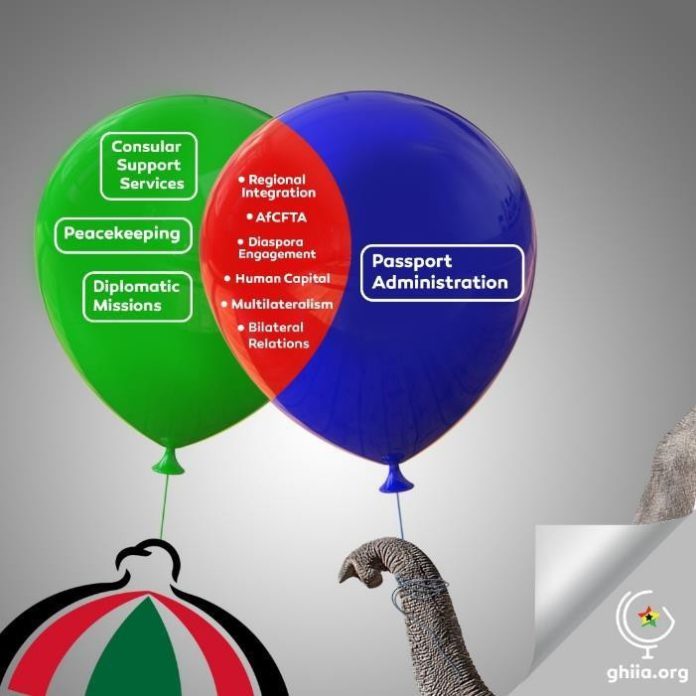
Since the birth of her 4th Republic through the promulgation of the 1992 Constitution of the Republic, Ghana has periodically held elections every four years without fail.
These elections have always been preceded by series of activities, prominent of which is the launch of manifestos – political party’ opinions, plans and promises to the people for which they should be voted into power.
Actually, manifestoes are, therefore, policy proposals which political parties may convert into policy positions into government.
Manifestoes have become a mark of multiparty democracy in many countries and Ghana is no exception. In effective democracies, they serve as an unbiased marker by which a government’s success is measured, and are instrumental in enabling the citizenry hold various parties that win power accountable.

The Ghana flag hoisted on a pole in the City of London. Ghana has over 100 missions around the globe. Picture source: Getty Images
With the 2020 General Election fast approaching, we are in the season of manifestoes and conversations around policies and ideas for governance are the order of the day. The two main political parties have al launched their manifestos, each with a foreign policy component.
Foreign policy components of manifestoes serve as a guide or indication on how a political party believes the country should proceed in prosecuting its interests’ externally. It is worth mentioning that, of all the political parties contesting in this year’s elections, only the NDC and the NPP have launched manifestos that explicitly contain foreign policy positions. Thus, this article seeks to shed light on the foreign policy positions as stated in the 2020 manifestos of the NDC and the NPP.

United Kingdom’s Prime Minister Theresa May Greets President Akufo-Addo at No.10 Downing Street (20th November 2017). President Akufo-Addo is the leader of the NPP. Picture Source: Prime News Ghana.
On the 22nd of August 2020, the ruling New Patriotic Party launched its Manifesto under the theme: ‘Leadership of Service: Protecting our progress, Transforming Ghana for all.’ Led by President Nana Addo Dankwa Akufo-Addo, the governing party made nine main promises for Ghana’s Foreign Policy, to be implemented between the years 2021-2025.
These promises and policy positions are:
- Continue to promote and support ECOWAS and the AU domestically and internationally to
accelerate the pace of regional and continental integration and engage as a united front in global
relations - As the host country of the Secretariat of the African Continental Free Trade Area (AfCFTA), be very
active in seeing to the operationalisation and success of AfCFTA - Expand the level of engagement with, and promote the interests of the Ghanaian and African
Diaspora - Continue to facilitate the election and appointment of Ghanaians to positions in various
international organisations. To this end, the Foreign Affairs Ministry has created a Candidatures
Unit to pursue aggressively vacancies that may occur in various international organisations and
recommend, as well as support suitable Ghanaians to apply - Strengthen our engagement, among others, at the multilateral level including Sessions of the
United Nations General Assembly, United Nations and other international Conferences,
Commonwealth Heads of Government Meetings, and La Francophonie (OIF) - Exchange of High-Level Visits consistent with efforts to deepen substantially Ghana’s international diplomatic footprints and strengthen bilateral relations in pursuit of our political, cultural, and economic interests, and
- Strengthen relations with countries in the Americas, the Caribbean, and Asia
- Introduce chip-embedded passports to keep up with technological advancement and enhance the security of Ghanaian passports, and
- Implement the project to issue Machine-Readable Visa Stickers.

For the purpose of this article, these positions/promises have been broadly categorised into seven thematic areas:
- Regional Integration
- AfCFTA
- Diaspora Engagement
- Human Capital Development
- Multilateralism
- Bilateral Relations
- Passport Administration
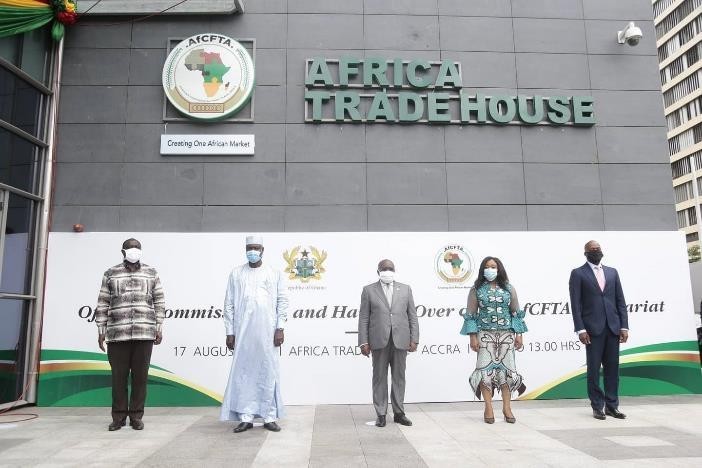
NDC Manifesto – FP position
The main opposition party, the National Democratic Congress, also launched its Manifesto dubbed, The People’s Manifesto, on 7th September 2020. In this manifesto, the NDC put forth 17 “Promises” for the conduct of Ghana’s international relations.
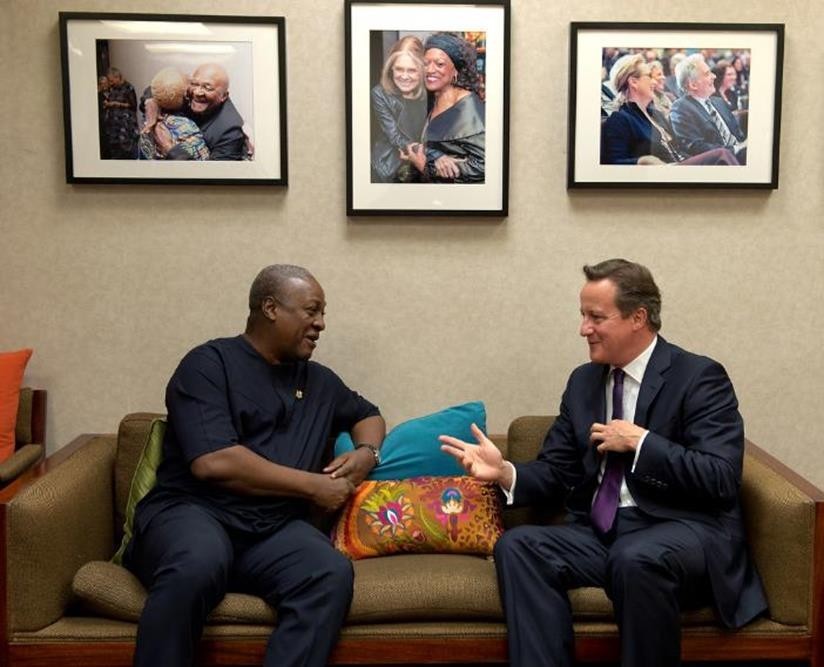
United Kingdom’s Prime Minister David Cameron having a chat with President John Mahama in London (12th May, 2016). Former President Mahama is the leader of the NDC. Picture Source: Crown copyright.
The promises and policy positions by the NDC include:
- Formulate an economic diplomacy blueprint to serve as a policy guide to diplomats and all staff
of the Foreign Service on clear deliverables under Ghana’s economic diplomacy agenda - Enhance the general conditions of service for Foreign Service Staff including restoring duty
waivers on vehicles for staff returning from postings - Leverage and place Ghana’s hosting of the African Continental Free Trade Secretariat at the heart
of our industrialisation drive by ensuring that Ghana becomes Africa’s trade, transport and
investment hub. - Restore the high regard for career diplomats, enhance esprit de corps and meaningful career
progression deserving of career diplomats by ensuring that the majority of ambassadors and
envoys are selected from the stock of career diplomats. - Establish a Consular Support Fund as a line item in the budget of the Ministry of Foreign Affairs
and Regional Integration to cater for distressed Ghanaians abroad who may require urgent
consular assistance. - Conduct an asset inventory of all diplomatic properties with the view to pursuing an aggressive
asset improvement and maintenance programme – this review will also seek to address the
phenomenon of unsustainable expenditure on rent in favour of the more economically prudent
option of owning our own properties. - Deepen Ghana’s famed Pan African credentials by putting forth a raft of policies targeted at
forging stronger and concrete bonds with Africans in the diaspora and African Americans beyond
the occasional visits afforded by “PANAFEST” and “The Year of Return” to a more permanent
mutually benefiting relationship. - Ensure that consistent with our track record, we will actively canvass for many more Ghanaians
to assume high offices in reputable multilateral organisations. - Renew our commitment to the UN Sustainable Development Goals and the AU’s Agenda 2063 by
fully domesticating and aligning our development goals across all sectors with these global
imperatives - Further enhance Ghana’s internationally renowned image in peace operations which marked a
milestone this year in commemoration of sixty (60) years since Ghana’s first peace operations
deployment in the Congo - Improve conditions of engagement and also increase the number of females in troop deployment
consistent with modern UN standards - Protect the inviolability of the premises of all Foreign Missions in Ghana as required under the
1961 Vienna Convention on Diplomatic Relations and the 1963 Vienna Convention on Consular
Relations in order to avoid the recent embarrassing spectacle which created a diplomatic standoff between Ghana and Nigeria when the latter’s properties were demolished in Accra - Reappraise the geographical representation and economic significance of our diplomatic and
consular missions and establish new missions strategic to our national development especially in the areas of trade and investment, tourism, and educational opportunities
- Appoint trade officers to specifically designated Ghana diplomatic missions to aggressively market
Ghana’s competitiveness in trade and investment activity and spearhead the implementation of
agreed strategies. - Continue to play an active and lead role in ECOWAS and work in concert with other member states
to consolidate the gains of the Community and to achieve its defined goals. - Increase collaboration within the United Nations, the Commonwealth, and other multilateral
organisations to fight existing and emerging threats to global peace, security, and sustainable
development including climate change and global warming, international terrorism, cybercrime,
piracy, money laundering, narcotics trade, human trafficking and pandemics - Deepen our involvement in the affairs of the Francophone and UEMOA with a view to better
understand those organisations and reaping the maximum benefits from them given our
geographical position of being surrounded by three Francophone countries.
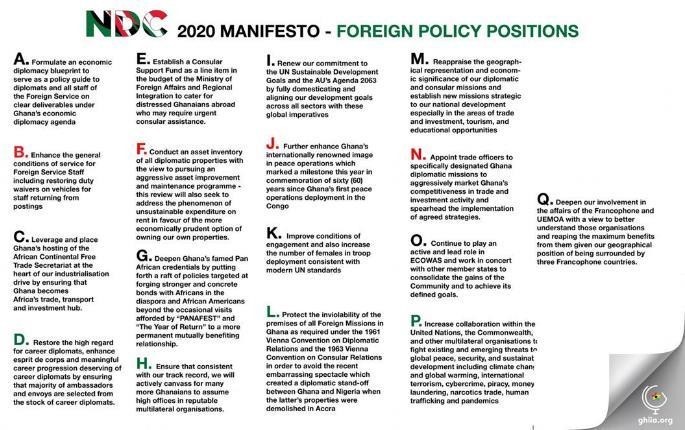
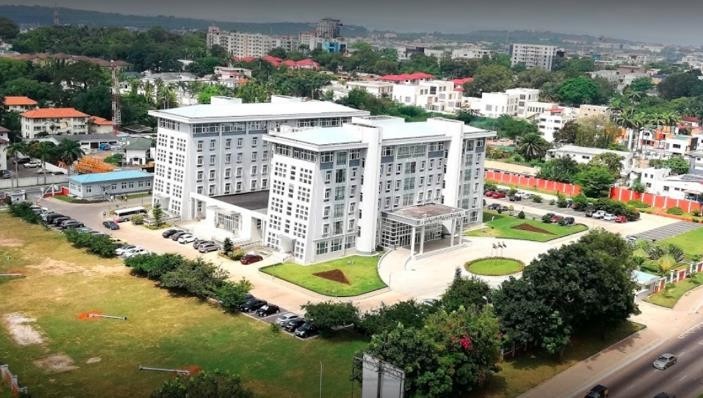
The MFARI Complex is a testament of Ghana’s positive and impactful foreign relationships. The construction of this complex was possible with a grant from the PRC. Picture Source: www.myjoyonline.com
For the purpose of this article, these positions/promises have been broadly categorized under 10 thematic areas:
- Economic Diplomacy
- Human Capital Development
- AfCFTA
- Consular Support
- Diaspora Engagement
- Peacekeeping
- Regional Integration
- Multilateralism
- Bilateral Relations
Deductions
The two main political parties in Ghana have laid out their plans for the next four years of Ghana’s Foreign Policy. An analysis of the various plans and promises shows that they are all in line with the directive principles of state policy as captured in the 1992 Constitution of Ghana.
The NPP and NDC Manifestos converge on 6 themes namely:
I. Regional Integration (NPP Promise 1 and the NDC Promises 9, 15 & 17.)
II. AfCFTA (NPP Promise 2 and NDC Promise 3)
III. Diaspora Engagement (NPP Promise 3 and NDC Promise 7)
IV. Human Capital (NPP Promise 4 and NDC Promises 2, 4 & 8)
V. Multilateralism (NPP Promise 5 and NDC Promise 16)
VI. Bilateral Relations (NPP Promise 6 & 7 and NDC Promise 12)
Key differences between the two manifestos’ position on Foreign policy include;
I. Passport Administration in the NPP manifesto captured in Promise 8 & 9
II. Consular Support Services in the NDC Manifesto captured in Promise 5
III. Peacekeeping in the NDC manifesto captured in Promise 10 & 11
IV. Diplomatic Missions in the NDC Manifesto captured in Promise 6 & 13
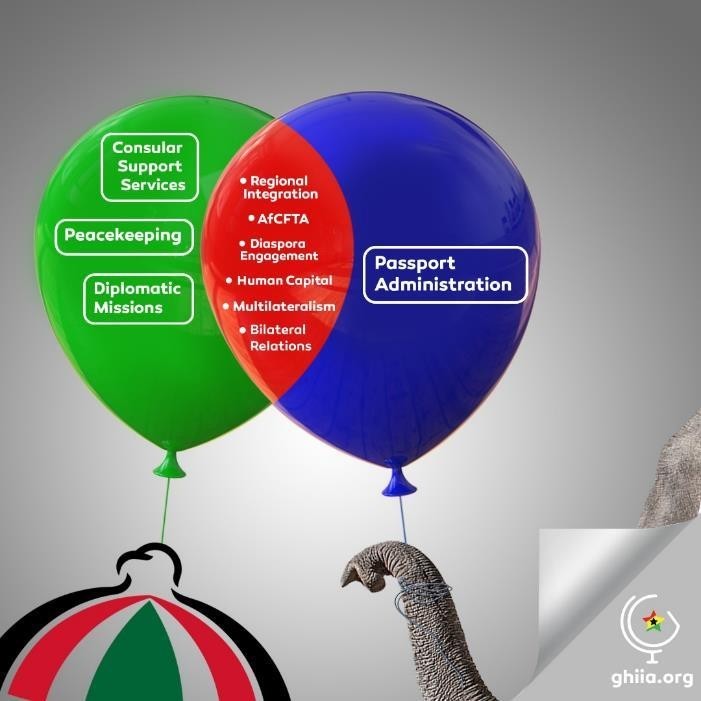
There are significant convergence and divergence as regards Foreign Policy in the manifestoes of the two main parties.
Picture Source: GHIIA.org
Conclusion
Although differences have been identified, the points of intersection noted above can be instrumental in finally ensuring that there is continuity and sustainability in Ghana’s Foreign Policy going into the future.
Knowledge @ GhIIA.org
GhIIA.org (Institute of International Affairs, Ghana) is a policy-think tank based in Accra. The Institute seeks to advance policy dialogue, innovation and analyses as regard International Relations issues in Ghana and West Africa.ir Visit irinthemanifestogh.org to learn more about the institute’s 2020 Election programme.
Visit the institute at Ghiia.org or follow us @
facebook.com/GhIIA.org to learn more about international relations.
Contact:
Cherk Klutse
Charles Ansre
knowledge@ghiia.org
